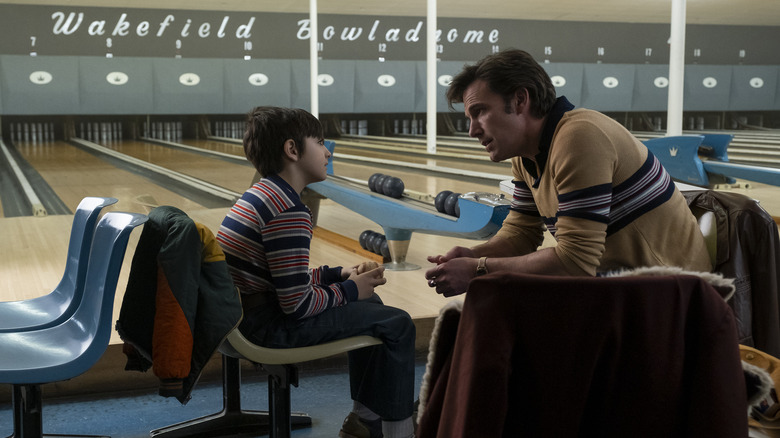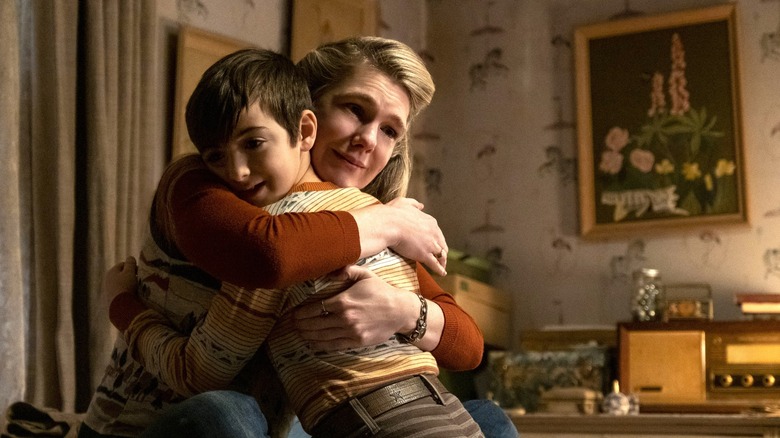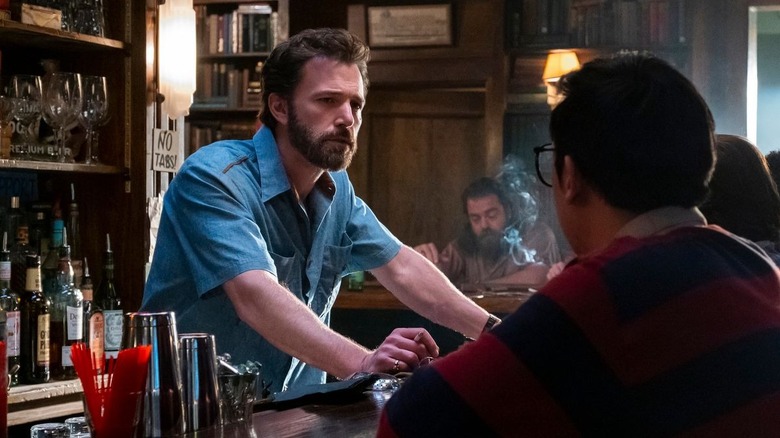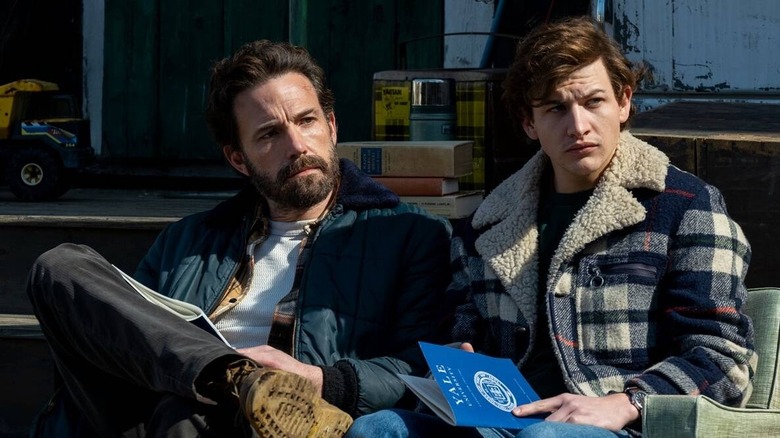The Tender Bar Screenwriter William Monahan On Adapting JR Moehringer's Unusual Memoir [Interview]
"The Tender Bar" is a story with a kind heart. Based on JR Moehringer's memoir, the film adaptation doesn't sugarcoat conflict to achieve any of its feel-good moments, either. The drama focuses on the bad times as much as the good times. Screenwriter William Monahan is behind the adaptation, which features Ben Affleck as the watchful Uncle Charlie. Anyone with a large family or lucky enough to have an Uncle Charlie, related or not, will recognize the beauty of the character.
The story is about far more than the aspiring writer's relationship with his uncle or his absent father, though. For Monahan, the story is as much about motherhood. During a recent interview with the Academy Award-winning writer of "The Departed" and "Kingdom of Heaven," he told us about his personal connection with the memoir.
"Well, if you're a writer, it kind of comes from nowhere."
How did you relate to JR's journey as a writer?
Well, if you're a writer, it kind of comes from nowhere and if you end up doing even in the ballpark as well as he did, you're going to relate to it to a certain extent. I connected with it on many levels. His mom in the memoir reminded me of my mom in the seventies. When it wasn't all that easy for women to get it together, especially if they were single mothers. They often ended up going home to the grandparents and stuff like that where life was wonderful, as the boy in the film says, when he says, "I like people." And so there's a lot of similarity. I didn't have the horrible drunken dad or any anybody mean or unreasonable around me, but there were a lot of the same things.
The mother was in a similar situation from time to time. And there were uncles who had room after room of books, without which I wouldn't be here. Probably the same way JR wouldn't be there, if he hadn't had the books and the support of his family. And one of the important things about the memoir that attracted me to it is the fact that it's quite unusual for a first book by a young writer, in that he makes more of his family than he does of himself.
It's not the usual thing where the writer throws a family in the background and the friends under the bus in order to mythologize himself. For example, Hemingway or Fitzgerald, who totally chewed everything up to aggrandize themselves and basically wrote in a spirit of l'esprit d'escalier, a staircase wit. Where in their fiction, the characters who were them were always saying fantastic things that they didn't think of at the actual moment, you know? So it was a refreshing book when it came out and it changed publishing a little bit, because memoir became absolutely mainstream. And in JR's case, it replaced the traditional first novel.
How about his days in journalism? Did your experience for Spy magazine make you relate there as well?
Well, I didn't work for The Times. I think we were there at about the same time, maybe later, because I went into it at probably 30. I was 30, because I'd been a musician before I got really serious about writing. There's a patch of writing in my twenties we don't need to get into, but we were in New York about the same time. He was a serious journalist. He was legit. I did everything I could to avoid being legit. I had just been a musician. I was interested in doing totally out there cultural criticism and comedy. I was basically a comic essayist, I wasn't a journalist. I got into it and I became an editor and stuff like that, but it wasn't what I was going to do. In JR's case, he went on to win a Pulitzer prize for journalism. So obviously he was taking it more seriously than I was. I was for the non-existent Hunter Thompson job that later Matt Taibbi came in and took after I left the newspaper.
"Does something feel right?"
I didn't know you were a musician. Any similarities between making a song and telling a story?
No. Maybe in the matter of doing things by instinct and that's it. You always know when something's in tune, when something's playing, not that it in punk rock being in tune or playing was all that important, but, I wouldn't draw an analogy to it. It's just a matter of feel. Does something feel right? Is it playing? Does it work? And you can't really analyze it or intellectualize it. I'm more of an intuitive person across the board.
With remakes like "The Gambler" or "The Departed," you've said a part of your job is being as ignorant as possible of the original source. Say when you're adapting novels like "The Tender Bar" or "The Blood Meridian," how's your approach different?
I was able to select a lot of detail from JR's memoir, "The Tender Bar." I was explaining to someone earlier, "The Departed," which I refer to as the albatross around my neck because I always have to talk about it, is that was very few pages of a transcription of dialogue from a Chinese film. It wasn't even the action. The action wasn't written down. So basically what I had to do was I had to go in and make it work. There wasn't a line of dialogue that could make it and very, very few situations. And then, of course, it gets into, "Well, Scorsese and Monahan obviously not only saw just one film, but all of them. Every Chinese film ever made and put it into 'The Departed'." Not even one did. I did, in that case, I wanted to be ignorant of the motion picture. And you'd see a couple of things. Like, there's a still picture of a rooftop with guys with guns and some other things that looked like it could have come out of Michael Mann's "Heat."
"Don't look for your father in the radio."
For "The Tender Bar," it was your first draft they shot right?
You're right. "The Gambler" was also first draft. I don't know if that one should have been [Laughs]. I usually do the rewriting before I send it out. I mean, I won't let anything go out if it doesn't work. And if it doesn't work, I'm not going to let anybody else tell me about it. I can see if it doesn't work.
I know how much "Hamlet" means to you. With the father-son dynamic in the movie, did "Hamlet" often come to mind?
Well, what's it all about? I brought up earlier, what's one of the main things in "The Tender Bar," it's about kill the father. There's a Freudian thing about Vatermord, father killing, in German. So you've got to kill the king in order to proceed in life. And that's why people ought to be very cautious about writing reviews as ambitious young artists, because you sort of realize, like I did in the 1990s, that I was attacking my betters. Because I thought they had my stuff. They had my money, they had my fame, they had my job.
And then I caught myself doing it once I was writing this blistering review of David Foster Wallace. And then I thought, wait a minute, man, you know what you're doing here, right? You're taking out the guy who just won the MacArthur Grant. That's what you're doing. And you have no business doing it, go off and write a novel. Do something with yourself. Anyway, that's a tangent, but the Vatermord thing, it's interesting that you bring up "Hamlet." I didn't even think of it, but in that one it's kill the king and then you die. In this one, it's more forget the king and then you live. What's he do? Gets the king arrested. It's more of a modern solution [Laughs]. This guy's a pain in the ass, just forget him.
You know, uncle Charlie says at one point, "Don't look for your father in the radio." That's a direct "Hamlet" thing. "Don't look for your father in the dust."
"The Tender Bar" is now streaming on Amazon Prime Video.



